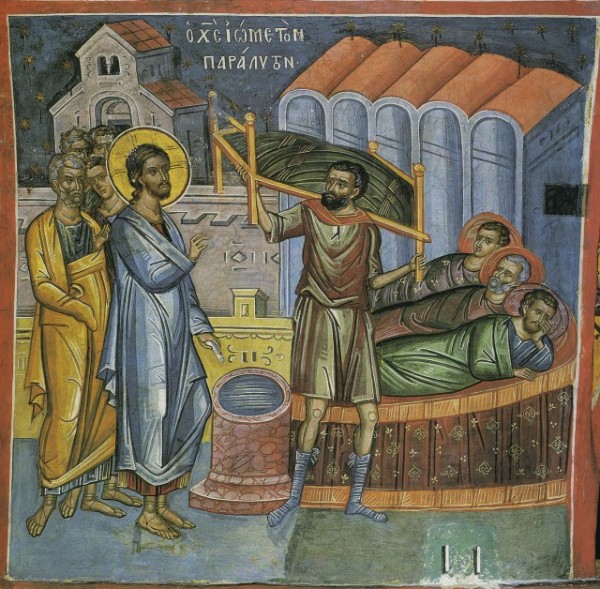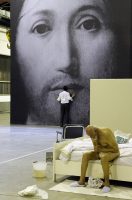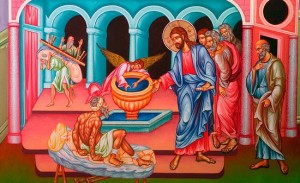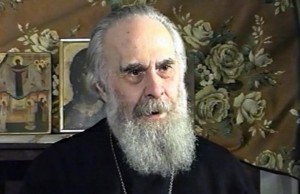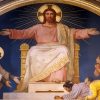In the name of the Father, of the Son and of the Holy Ghost.
Between Easter and Pentecost, the day when the Spirit came upon the Apostles, we read those passages from the Gospel which revealed in the course of Christ’s ministry on earth that God had given Him power to heal the sick, to renew the life of men and to grant life eternal to those who believe in Him and unite themselves to Him.
Today’s reading is one of those in which we see the power of God made manifest in the person of Christ. And I would like to attract your attention to several points in the reading.
A man was sick for 38 years of his life, the most part of it he was a paralytic, he could not move a limb, he lay prostrated by the pool from which he expected healing and a new life. But what is true of him is true of us; he was paralysed in the limbs of his body, we are paralysed in the limbs of our soul. The energies of our soul, of our mind, of our heart, of our will, of our body itself are fettered, fettered by the fact that we have no courage and we have no power within us to move and to act to the full of our longings, to the pool of God’s calling. And here we stand, year after year on the very edge, on the bank of the pool that could give us life if someone came and helped; and for years we may find that no one is there because everyone is concerned with someone else.
This is a sad thought that a person can be paralysed in body and soul and be passed, by people full of concern, but of concern for others which is not for the suffering, but a particular sufferer, that another person may be in the same tangles of agony, but he is not one of us, he is not ours, and therefore we pass him by. But there is One Who never passes by anyone, anyone who is in need of a pool of water to bring him life: it is the Living God, the Living God Who had become a man to be one of us and come to the rescue and the salvation of anyone in need without discrimination, without distinction, simply meeting in compassion and in love the need of the needy.
And so, when we feel fettered, when we feel helpless, when we feel powerless to move, either in mind or in heart to stir our will or to bring into motions our body to do what is right and should be done, let us not look round, but let us look inward to the place where God is because strength and power come from within: not from within our own ability and strength, but from that depth in which the Lord God dwells in us through our participation in His Incarnation, through the gift of the Spirit bestowed upon us.
But is it always true that what we want (?) to be healed? So often we would say: Of course we want to be healed, why ask such a question! Does not everyone wish to be free, wish to be whole, wish to be capable of action and a fullness and abundance of life?.. In principle, — yes, but how often do we seek refuge in our weakness, in our illness, in our lack of power in order not to face and not to meet the need and the challenge of life?
Many of us, if we were asked by one who could read our souls and bring out the truth within us, would say: No, I prefer to cling to this twilight of life, to the transienty of it, to the frailty of it rather than to deny myself, to take up my cross and follow Christ whithersoever (?) He goeth. Many of us would say, ‘My weakness and my illness, my lack of power is my only salvation from the claim of wholeness, a wholeness which carries with it, within it, responsibility, responsibility to live worthily of God, worthily of the commission which is given us by Christ when He said, ‘As my Father sent Me, so do I send you’. In this same way, on the same terms, on the same purpose but also with the same certainty that it is shedding our life for the neighbour that will allow him to be alive. And so, let us give a thought to this second aspect of things. Do we want to be healed?
And then, what happened to the paralytic? When Christ asked the paralytic whether he wanted wholeness, he acquiesced, and God did not simply give him wholeness out of the sense of which he would have began to live anew. Without promising anything, without giving him any awareness that he was already healed, Christ commanded him to get up, take up his bed and walk — what he knew he could not do. It was a moment to act on faith assuming that He Who gives the command has power to ensure its execution. And the man did it. But how often have we read the Gospel, how often have we read or heard passages from the New and the Old Testament or the Fathers, or spiritual writers, and been stirred by what they said, felt, ‘Indeed, I could do it’, but a moment later we have not done it and the emotion, the elation, the inspiration had gradually faded within us all so quickly and we were again helpless and hesitant: Shall I be able to do it? Will I find strength? Who will help me?, instead of saying, ‘If I have heard this word of God — and we can say that we have heard a word of God when our heart and mind and will, and our whole being had responded to it — if we have heard the word of God, I can do it, because He is the One Who speaks and the One Who gives strength and power to do’.
Let us again give thought to this because our life could be full, it could be abundant, it could rush like a torrent of eternal life through the world, beginning with our own soul, and our families, and the various communities in which we participate and bring life to others. Let us then give earnest thought to this: He Who has healed the body of the man of Bethesda can with the same word of power and of life give us wholeness, but on His terms, not on the cowardly terms which we offer Him, ‘Do it first and then I shall believe’. Let us say with another man whose child was ill: I believe, help my unbelief!, but out of the crowd of beliefs that there is in us let us listen, hear and act, and then our lives and the lives of others will begin to open to the eternal will, to the life of the Risen Christ to the power of the Spirit. Amen.












